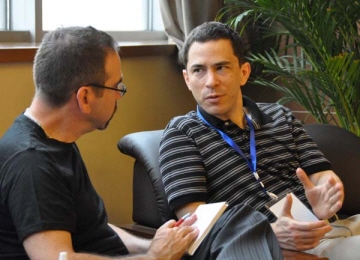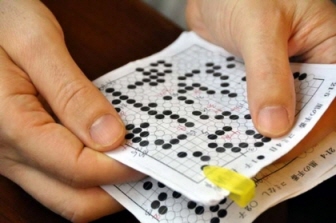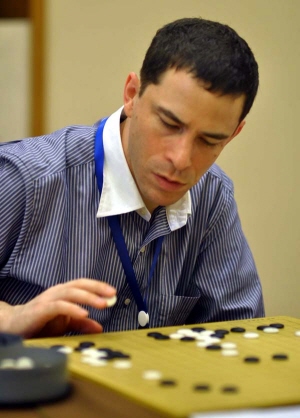Interview: Micheal Redmond 9P

"My study of the endgame actually had more effect on my opening," Michael Redmond 9P told the E-Journal during a recent interview during the World Amateur Go Championships in Hangzhou, China. Redmond, who this issue becomes a regular game commentary contributor to the E-Journal (Member's Edition only; click here to join), shared his tips on studying, improving, and thoughts on the differences in professional training in Japan, China and Korea.
Over the last year or so, Redmond has been studying the classic Castle Games, with special attention to close games. "The result was that I was reviewing very high-quality games, games in which the players were not being greedy, but were going for the balanced moves, and showing very good positional judgment, and I think that reflected onto my game and helped me a lot," said Redmond. "I'm much more aware of what's going on."
Still, Redmond knew he had to focus on improving his endgame. "What happened was that I ended up with this big collection of close games, and I had them in Word and could print them out." Redmond pulled a small booklet of clipped-together sheets from his pocket. "So what I did last year was to copy game positions about 30 moves from the end of the game. I like the fact that I don't have the names of the players, because it brings back memories (of the specific players), so it's better not to be seeing that. I write the result – for instance in this game, White wins by one point – so I have to hold the position in my head and count it, and by doing that, I think I'm improving my reading ability. Not just reading out an endgame, but life and death problems, as well."
Redmond explained that "The problem is that you can have two endgame moves that are about the same size, but they each lead to a different endgame." He launched into an analysis involving calculations of moves as small as 1/6th or 1/12th of a point, "so you have very fine points implicit in the seemingly simplest yose moves, including follow-ups and ko threats, which complicate the calculation." And, he added, "calculating is not good enough; in fact it's confusing, because there's no way to see which move is bigger, you just have to read it out, and then it's very clear. Right now I can do 30 moves, and I have done a 50-move yose."
Eventually Redmond expects to be able to read out the last 100 moves, "because top players are capable of reading out the last 100 moves in less than an hour. If I can have a picture of what's happening when I come to the last 100 moves, it'll make a big difference." If all of this sounds a bit confusing," Redmond's the first to agree, but said that "it shows that just calculating the size of a move, which is what I've been doing for years now, is pretty useless. Or I should say it's useful, but it's not exact, and it's the reason why it's pretty easy to lose a couple of points with that system."
Asked about how he and other top professional study, Redmond said that "Everyone has their own system," adding that "I think one of the weaknesses of Japanese go as a whole is that we don't have any coaches. We all improvise on our own. The Chinese have coaches, and I think the Koreans do too. I think the idea of having coaches is a very good system." The downside of the coach system that that "it changes the way a person's game develops at the lower levels, and I think that in China it makes it more difficult (for individual players) to have a lasting strength."
Conversely, Redmond said, the Japanese system turns out to have a hidden strength, because while Japanese players don't have an established counter to the new Chinese or Korean moves, "the strength is for the player himself. In all of his personal study, he will be building a feeling for the game, which should last longer. So I think both methods have their strong points."
Redmond said he doesn't play much on the internet these days. "I wasn't sure it was improving my game. It's very hard to play at my best when I can't see my opponent; it makes a difference in my feeling for the game. I think I concentrate better if I have an opponent in front of me. And I enjoy it more." Redmond added that playing in person is the best way to improve your game. "Someone close to your own strength, a little stronger or even a bit weaker. Gives you a different viewpoint. And review your games. "
- Chris Garlock; photos by John Pinkerton
- American Go E-journal
New update
